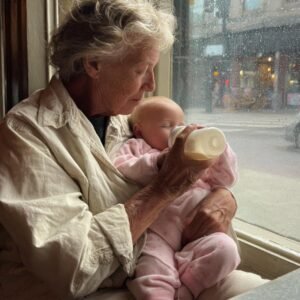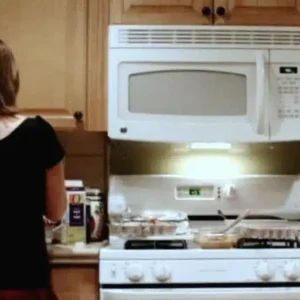Matthew walked into the library on a rain-soaked Tuesday like he belonged there—hands in his coat pockets, smile soft enough to make noise feel rude. I was shelving returns that smelled like wet paper and dust when he asked for a rainy-day book.
“A Moveable Feast,” I said, sliding Hemingway across the counter.
He came back three days later, damp hair pushed off his forehead, and told me my taste was “exquisite.” He started timing his visits to my late shifts, turning up with tea exactly how I like it—strong, oat milk, no sugar. He’d lean on the desk and ask for “something real” about me while I scanned paperbacks.
“I still sleep with my childhood teddy bear,” I blurted once, then instantly regretted it.
“That’s not embarrassing,” he said, grinning. “That’s adorable.”
He walked me home in the rain, kissed my forehead, bought sunflowers “for your living room to try their best.” We watched documentaries on my lumpy couch and rewrote the endings of moody films until we were laughing at our own cleverness. Six months later he tucked a secondhand ring into the pages of a book I loved and asked me to marry him. I was thirty-two, ready, and when he looked at me I felt like a person you keep, not a puzzle you solve. I said yes.
The pregnancy test blinked positive before either of us had learned how the other folded towels. “I know it’s soon,” I said, breath shaking.
He spun me clumsily around the kitchen. “It’s perfect, Eva.”
We decided to marry after the baby, to let my body heal and our life find its shape. The one odd itch I couldn’t quite scratch was never meeting his parents. “Toxic,” he’d say, waving it away. “You and the baby are my family now.” I met his sister, Erica—polished, confident, too kind by half. She arrived with lemon-poppyseed muffins and herbal teas, socks with pineapples when the weather turned. “She gets invested,” Matthew would murmur when her visits became daily and her hands moved through my drawers rearranging my leggings “for convenience.”
I told myself hovering meant love. I told myself a lot of things. Instead I folded onesies like prayer and hung a moon-and-stars mobile above the crib. When a late-night craving made me cry for vanilla ice cream with green olives and hot sauce (don’t ask), Matthew went out in the rain and bought all three.
Complications found us anyway. An infection. Another surgery. Blood transfusions. Our daughter, Holly, arrived early and perfect while my body broke open and rebuilt itself one exhausted hour at a time. Twenty-two days in the hospital taught me the geography of ceilings. I taped a photo of the nursery to the wall to remind myself home was a place waiting, not a dream I made up.
Matthew visited, but he never stayed long. A blanket that smelled like my pillow. A quick kiss. Eyes on his phone. “Overwhelmed,” I told myself, turning his speed into tenderness because that’s what love sometimes asks you to do.
When the doctor finally cleared me, I called him. He didn’t answer. Once, twice, three times. I dressed Holly in a tiny sleeper, buckled her into her car seat with hands that still shook, and whispered, “We’re going home.”
The taxi driver sprayed sanitizer like holy water and told me his sister had just had a boy. Congratulations. The small talk of normalcy made my chest ache with relief.
The porch light was off. The curtains were drawn. The house didn’t look abandoned, just indifferent. I climbed the stairs carefully; every step was a burn I tried not to show. I wanted the nursery—needed it—the way a tired swimmer wants the edge of the pool.
I opened the door and the floor seemed to drop.
The crib was gone. The mobile was gone. The wicker basket of folded swaddles and baby socks was gone. In their place: a couch, a TV, a coffee table. Nothing of us.
The bathroom door opened and Erica came out, damp hair, my old library fundraiser T-shirt hanging off her shoulder like she’d borrowed my life and found it comfortable. “Oh,” she said, not surprised. “You’re back. Great. Now I can tell you the truth and kick you out once and for all.”
Words like that don’t hit at first. They float, then land with a thud you feel in your knees. I shifted the car seat closer to me.
“Kick me out?” I said. “This is my home.”
She laughed like I’d told a sweet joke badly. “No, sweetheart. This was never your home. Matthew rented this place to make you feel safe. Our real house is across town. New tenants move in tomorrow. It was all a set.”
“A set,” I repeated, because sometimes you have to hear yourself say the impossible.
“A prop,” she said brightly. “Once you hand over the baby, you can go back to your little life. We’ll take it from here.”
“My baby,” I said, slow, trying to hear my own voice under the roar in my head.
Erica sighed, bored now. “Don’t play dumb, Eva. I’m not Matthew’s sister. I’m his wife. We needed someone to carry our child. I can’t have kids. He said you were perfect—quiet, no close family. You’ll be paid generously. Just take the money and walk away.”
She reached for the car seat like she expected muscle memory to do her work. I stepped back. Her face tightened.
“You won’t win,” she said softly, the kindness rinsed clean. “Matthew’s the legal father. He has money. Lawyers. He’ll get custody in a heartbeat. You’re a librarian with a soft voice and overdue cards. Be sensible.”
I walked out without answering. I didn’t feel my legs until I was in another taxi. The driver glanced at the car seat and sighed about crying babies. Holly’s breath was warm against my arm, her tiny mouth pursed in sleep. I pressed my forehead to the window and let quiet sobs shake through me until the glass cooled them down. Love bloomed in my chest with something feral underneath. They don’t get you, I promised her. Not now, not ever.
I had nowhere to go. I’d given up my apartment when I moved in with Matthew. My mother’s door was the only one I could knock on. We hadn’t talked much since I got pregnant. She never liked him, said he wore charm like a mask and I wanted the fairy tale too much. We argued until silence seemed easier.
She opened on the first knock. Saw my face, then saw Holly’s. She didn’t say “I told you so.” She said, “Soup or tea?” and pulled us inside. The relief made my knees weak.
An hour later my phone lit up with Matthew’s name. I pressed record and answered.
“Eva,” he said, voice sticky-sweet. “Where are you? Don’t listen to Erica. You know how intense she gets. Yes, she’s my wife, but you’re blowing it out of proportion.”
I let him talk. “She’s our baby,” he went on. “She belongs with us. You weren’t supposed to get so attached. Take the money. You’ll be fine. She’ll be better off.”
“So you admit it,” I said. “You lied. Erica is your wife. You used me.”
“Don’t twist it,” he snapped, irritation flaring. “You’re being emotional. You can’t give Holly what we can. Be realistic. A clinical surrogacy would’ve been a hassle anyway. We had more fun this way, didn’t we?”
I let him tighten the knot with his own words, asked a few careful questions, and when I had what I needed, I said, “Thank you, Matthew. See you in court,” and hung up.
The months that followed tasted like metal. There were nights I sat on my mother’s bathroom floor, Holly sleeping against my chest, legal paperwork spread like a second skin on the tiles. But I had receipts—texts, voicemails, that recorded call. I kept a binder like a librarian does: tabs, timelines, sonograms, dates, every small cruelty in their scheme. I found a lawyer who believed me and women like me enough to take the case pro bono.
In court I told the truth while my daughter slept in the crook of my arm. I described the rented house, the vanished nursery, Erica in my T-shirt telling me to hand over my baby like she was passing a dish at brunch. Matthew and Erica walked in smirking, sure money and polish would outshine evidence. They didn’t walk out that way.
I won.
Now Holly sleeps in a sun-yellow room my mother and I painted on a Saturday afternoon while fairy lights drooped and paper cranes dried on the line. Matthew sends a check because he has to, and he stays away because the judge said so. I hear Erica left town. I don’t ask where. I shelve books and recommend rainy-day reads and when someone asks for something “hopeful but not naive,” I know exactly what to hand them.
Sometimes my mother will pick up the knit blanket I finished on bedrest and say, “I never hated the idea of you being a mom. I just hated that he got to be part of it.”
“I know,” I tell her, meaning it now in all the places I couldn’t before.
Hope isn’t a perfect nursery behind a door you’ve been told is yours. Hope is your name on the lease, your baby’s breath warm on your collarbone, and your voice steady when you swear you’ll never let anyone write over your life again.





